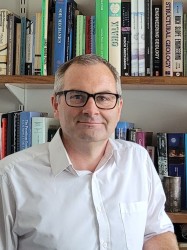Summary
Dr James Lawrence is a Reader in Geological Engineering. After graduating from Cardiff University with a MSc. in Mineral Resources he worked as a geologist in the petroleum industry before joining the University of Brighton. James worked at the University of Brighton for eight years as a researcher and lecturer, whilst working towards his PhD. His research focused on the engineering properties of the chalk in relation to coastal environments and processes. This research gave James the opportunity to work on several major pan-European research and industrial projects.
In 2008 James accepted a lectureship in Engineering and Petroleum Geology at the University of Leeds. With his team of research students James worked throughout Europe, the Middle East and Asia. James was Director of Masters Education and Deputy Director of the Earth Surface Science Institute research group.
In 2013 James left the University of Leeds to work in the Siting Team at Radioactive Waste Management Ltd (RWM) as the Geological Investigations Manager, where he managed the site characterisation project focusing on developing a new programme for the disposal of the UK’s radioactive waste in an underground Geological Disposal Facility (GDF).
James joined Imperial College London in 2016 as a Senior Lecturer within the Geotechnics Group, in 2022 he became a Reader in Geological Engineering. His research group concentrate on a holistic approach to geotechnics, Cretaceous and Cenozoic geology and geophysical methods. His current research is focused on the geology and geomorphology of Southern England and West Cumbria, development of remote sensing tools such as InSAR and other technologies to monitor ground movements, and Upper Cretaceous Carbonates (Chalk) driven by the needs of the civil engineering, nuclear and petroleum sectors.
James has successfully led over 15 research projects, authored over 30 publications in international journals. He has worked on several large infrastructure projects and written numerous industrial reports. Recent and current research projects include:
- Deformation measurement and geological insight from InSAR for the rural UK
- Understanding geological evolution of chalk cliffs and coastal processes using InSAR
- Detection of ground movement induced by the Tideway East deep tunnel, using InSAR and ground surveying
- Long-term nuclear decommissioning InSAR monitoring
- The safety and regulatory challenges associate with the geological disposal of the UK’s higher activity radioactive waste in England and Wales.
- The geology and geomorphology of West Cumbria
- The geological disposal of high level wastes in China
- Infrastructure challenges posed by The Harwich Formation
- The role of faulting in London: How tectonic-scale processes influence site-scale geotechnical behaviour
- Retardation of radionuclides and contaminants in weathered chalk
Teaching responsibilities include Rock Engineering, Soils and Engineering Geology, Site Investigation and Geomorphology at both undergraduate and postgraduate level. He leads four field trips each year in the UK and Greece. Current management responsibilities include 1st year co-ordinator for the Civil Engineering (MEng) course.
James is an executive committee member of the British Geotechnical Association (BGA), The National Representative of the International Society Rock Mechanics (ISRM), Member of the ISRM Commission on Radioactive Waste Disposal and he is on the editorial board of the Quarterly Journal of Engineering Geology and Hydrogeology.
Areas of expertise:
Upper Cretaceous carbonates (Chalk), Quaternary geomorphology, geological disposal of radioactive waste, geomechanics, structural geology, petroleum reservoir characterisation, InSAR (Interferometric synthetic aperture radar) coastal processes related to the impact of climate change and weathering of rock.
Publications
Journals
Carpenter A, Lawrence J, Ghail R, et al., 2023, The development of copper clad laminate horn antennas for drone interferometric synthetic aperture radar, Drones, Vol:7, ISSN:2504-446X, Pages:1-25
Shire T, Lawrence J, Agar S, et al., 2022, Satellite remote sensing of UK embankment dams: influence of dam features on monitoring quality, Dams and Reservoirs, Vol:33, ISSN:1368-1494, Pages:71-81
Zangana HA, Rashid F, Hussein D, et al., 2022, Reservoir characterisation of unconventional rock units in the middle jurassic Sargelu Formation, atrush field, zagros folded belt, Journal of African Earth Sciences, Vol:196, ISSN:1464-343X, Pages:1-11
Conference
Li HY, Lawrence JA, Mason PJ, et al., 2023, Unsupervised winter wheat mapping based on multi-spectral and synthetic aperture radar observations, ISPRS Geospatial Week 2023, Copernicus Publications, Pages:1411-1416, ISSN:1682-1750

